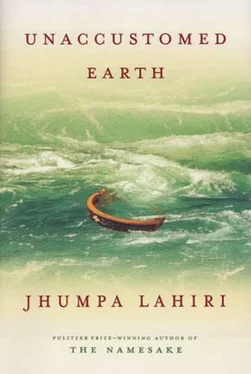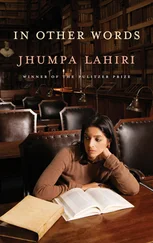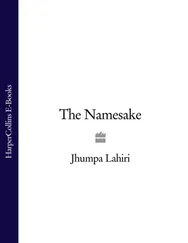"Is she there with you?" I asked. "Would you like me to say something?" I said this more as a challenge than out of politeness, not entirely believing him. Since my mother's death, I frequently doubted things my father said in the course of our telephone conversations: that he had eaten dinner on any given night, for example, at the Italian restaurant he usually took me to when I went home, and not simply polished off another can of almonds and a few Johnnie Walkers in front of the television.
"They arrive in two weeks. You will see them when you come home for Christmas," my father said, adding, "Her English is not so good."
"Worse than my Bengali?"
"Possibly. She will pick it up, of course."
I didn't say what came to my lips, that my mother had learned English as a girl, that she'd had no need to pick it up in America.
"The girls are better at it," my father continued. "They've gone to English-medium schools. I've enrolled them in their grades to start in January."
He had known Chitra just a few weeks, had met her only twice before their marriage. It was a registry wedding followed by a small dinner at a hotel. "The whole thing was arranged by relatives," he explained, in a way that suggested that he was not to blame. This remark upset me more than anything my father had said so far. My father was not a malleable man, and I knew that no one would have dared to find him a new wife unless he had requested it.
"I was tired, Kaushik," he said. "Tired of coming home to an empty house every night."
I didn't know which was worse-the idea of my father's remarrying for love, or of his actively seeking out a stranger for companionship. My parents had had an arranged marriage, but there was a touch of romance about it, too, my father seeing my mother for the first time at a wedding and being so attracted that he had asked, the following week, for her hand. They had always been affectionate with one another, but it wasn't until her illness that he seemed fully, recklessly, to fall in love with her, so that I was witness to a courtship that ought to have faded before I was born. He doted on her then, arriving home at our Bombay flat with flowers, lingering in bed with her in the mornings, going in late to work, wanting to be alone with her to the point where I, a teenager, felt in the way.
"I thought," he continued, "since your bedroom is a good size, of putting the girls together there. Would you mind terribly staying in the guestroom when you visit, Kaushik? Most of your things are with you now anyway. It is just a matter of where to sleep. But please tell me if you mind." He seemed more concerned about my reaction to a new room than the fact that I had just acquired a new family.
"It's fine."
"You are being honest?" "I said I don't mind."
I returned to my dorm room. There was a girl in my bed that morning; she had remained asleep as I pulled on my clothes and stumbled barefoot into the hallway to answer the phone. Now she was lying on her stomach, a pen in her hand, finishing a crossword I'd abandoned. Her name was Jessica, and I'd met her in my Spanish class.
"Who was that?" she asked, turning to look at me. Strong sunlight angled in from the window behind her, darkening her to the point that her features were obscured.
"My father," I said, squeezing back into the bed beside her. For a while she continued pondering the puzzle as I lay curled at her side, the unfamiliar smell of her still thrilling. She knew nothing about my family, about my father's recent visit to Calcutta or about my mother's death the summer before I started college. In the course of our few weekends together I had told Jessica none of those things. That morning, after crying briefly against her body, I did.
After my exams I drove to Massachusetts, dropping off Jessica on the way at her parents' farmhouse in Connecticut. When I decided to attend Swarthmore my father gave me the Audi he'd bought after we moved back from Bombay. He said that it would make it easier for me to come home from Pennsylvania during weekends and holidays, but I knew it was really an excuse to get rid of yet another thing my mother had touched, known, or otherwise occupied. The day we came back from the hospital for the last time, he took every single photograph of her, in frames and in albums, and put them in a shoebox. "Choose a few, I know pictures are important to you," he told me, and then he sealed the box with tape and put it in a closet somewhere. He had wasted no time giving away her clothes, her handbags, her boxes of cosmetics and colognes. That is probably the last time I remember you from that period, you and your mother coming to the house one day and spending an afternoon going through my mother's drawers as many others already had, fingering her things, lifting her sweaters and shawls to their chests to see if they would flatter them, testing to see if Chanel No. Five would react as favorably with their skin. The items you and your mother and the other Bengali women had no need for were sent to charities in India, as there was nowhere in New England to donate all those saris with their matching blouses and petticoats. This was according to my mother's instructions. "I don't want all that beautiful material turned into curtains," she'd told us from her hospital bed. Her ashes were tossed from a boat off the Gloucester coast that a coworker of my father's, Jim Skillings, had arranged for, but her gold went back to Calcutta, distributed to poor women who had worked for my extended family as ayahs or cooks or maids.
It didn't matter to me that her things were gone. After Bombay she had little occasion to wear jewels and saris, saying no to most of the parties she and my father were invited to. Coming home from school toward the end, I would find her sitting wrapped in a blanket, looking out at the pool she no longer had strength to swim in. Sometimes I would take her outside for fresh air, walking carefully through the birches and pines behind the house and sitting with her on a low stone wall. Occasionally, feeling ambitious, she would ask me to drive her to the sea. "Be sure to keep my ruby choker and the pearl and emerald set for the person you will marry," she said during one of these walks. "I'm not planning on getting married any time soon," I told her, and she said that she wished she could say the same for dying. Ultimately, I disobeyed her. After she was gone I was unable to open up and examine the contents of all those flat red boxes she'd kept hidden in a suitcase on her closet shelf, never mind set something aside for the sake of my future happiness.
Late in the afternoon I climbed the road that led to our driveway. Our house was the only source of light for miles, amid isolated patches of hardened snow. It was not an easy, typically inviting place. Stone steps had been built into the uneven ground, flanked by overgrown rhododendrons leading to the entrance. I saw from the other car in the driveway that my father was home, and he stood behind the storm door, waiting for me to come in with my things.
"We were expecting you earlier," he said. "You said you would be here by lunchtime."
I knew then that it was true, that there was another person inside the house, a person who made it possible for my father, without hesitating, to say "We" instead of "I." I said nothing about my detour to Jessica's home and the two hours I'd spent there. Instead I said the traffic had been bad. I wondered if my father had left work early for my sake, or if perhaps he had not gone into the office that day. I could not tell from his appearance. He had given up wearing suits and was dressed as he might be for the weekend, in dark blue pants and an cream-colored sweater. There was more gray in his hair than I remembered, and though he was still vigorously handsome, old age was creeping into his face, the skin sagging at the sides of his nose, his pale greenish eyes-a trait that made my mother insist that there was Irish blood on his side of the family-less curious than they had once been. I tried to imagine him, just weeks before, in a silk kurta, a groom's topor on his head. I wondered who had taken photographs of the wedding, whether my father would show them to me.
Читать дальше












